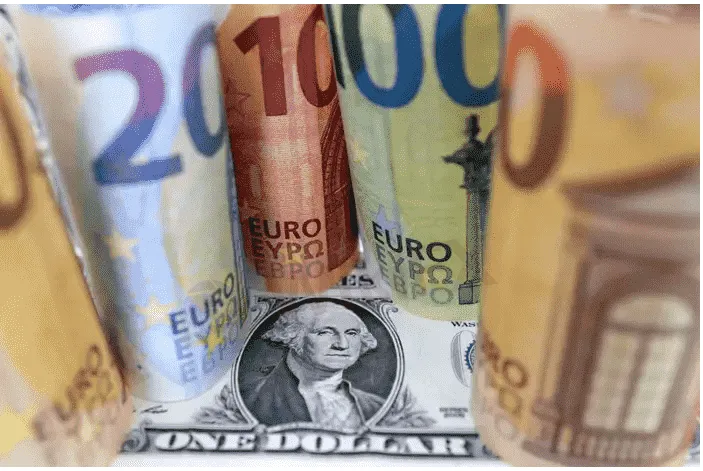简体中文
繁體中文
English
Pусский
日本語
ภาษาไทย
Tiếng Việt
Bahasa Indonesia
Español
हिन्दी
Filippiiniläinen
Français
Deutsch
Português
Türkçe
한국어
العربية
NZ, Aussie dlrs have busy day, Fed minutes loom
Abstract:The Australian and New Zealand dollars were volatile in Asia on Wednesday, before ending up back near where they started, providing some excitement ahead of the release of minutes of the U.S. Federal Reserve’s latest meeting later in the day.

The kiwi jumped to as high as $0.6383 after the Reserve Bank of New Zealand hiked rates by an expected 50 basis points (bps) and pointed to the need to bring forward the timing of future rate increases.
The currency then pared its gains and was last 0.28% higher at $0.6361.
“It (the RBNZs remarks)was marginally on the hawkish side, enough to keep the pressure on rates,” said Jason Wong, senior market strategist at BNZ, who said the track for the official cash rate implied another 50 bps hike in October.
Across the Tasman Sea, the Australian dollar fell as much as 0.5% after data showed Australian wage increases missed forecasts and lagged badly behind inflation. It later pared those losses to trade down 0.15%, holding back just above the symbolic $0.7 level. [
Elsewhere, the dollar index, which tracks the greenback against six main peers, was a fraction lower at 106.3, having ended on Tuesday largely unchanged.
The index has recovered most of the ground it lost last week after a cooler-than-expected U.S. inflation reading but remains well off its mid-July top of 109.29.
“The Fed‘s beef with the market in recent days and weeks has been that they (the Fed) don’t subscribe to the markets view that it will be cutting rates in 2023,” said Ray Attrill, global head of FX strategy at National Australia Bank.
“So if there are things in the minutes that push back against that notion, and that leads to a repricing of the U.S. rate curve for 2023, that could be a catalyst for a reversal of the U.S. dollar weakness that has characterised this last month or so.”
Also of interest is whether the recent equity market rally would continue, he said, as risk sentiment and the U.S. dollar had been negatively correlated in recent months.
The euro was steady at $1.0180 after squeezing out small gains overnight, and sterling was last fetching $1.21225, up 0.2% ahead of inflation data that is expected to be red hot.
The Japanese yen was at 134.1, little changed in Asia trade. The currency has been a major beneficiary of the softer dollar and firmed to as much as 131.7 per dollar last week, but has since given back some of those gains.
In cryptocurrencies, bitcoin was back hovering around $24,000, down from a two month high of $25,200 hit Monday.

Disclaimer:
The views in this article only represent the author's personal views, and do not constitute investment advice on this platform. This platform does not guarantee the accuracy, completeness and timeliness of the information in the article, and will not be liable for any loss caused by the use of or reliance on the information in the article.
Read more

The Hidden Checklist: Five Unconventional Steps to Vet Your Broker
Forex broker scams continue to evolve, employing new tactics to appear credible and mislead unsuspecting traders. Identifying these fraudulent schemes requires vigilance and strategies beyond the usual advice. Here are five effective methods to help traders assess the legitimacy of a forex broker and avoid potential pitfalls.

Doo Financial Obtains Licenses in BVI and Cayman Islands
Doo Financial, a subsidiary of Singapore-based Doo Group, has expanded its regulatory footprint by securing new offshore licenses from the British Virgin Islands Financial Services Commission (BVI FSC) and the Cayman Islands Monetary Authority (CIMA).

CFI’s New Initiative Aims to Promote Transparency in Trading
A new programme has been launched by CFI to address the growing need for transparency and awareness in online trading. Named “Trading Transparency+: Empowering Awareness and Clarity in Trading,” the initiative seeks to combat misinformation and equip individuals with resources to evaluate whether trading aligns with their financial goals and circumstances.

Malaysian-Thai Fraud Syndicate Dismantled, Millions in Losses Reported
The Royal Malaysia Police (PDRM) has received 26 reports concerning the Nicshare and CommonApps investment schemes, both linked to a major fraudulent syndicate led by a Malaysian citizen. The syndicate’s activities came to light following the arrest of its leader by Thai authorities on 16 December.
WikiFX Broker
Latest News
Top 10 Trading Indicators Every Forex Trader Should Know
ASIC Sues Binance Australia Derivatives for Misclassifying Retail Clients
WikiFX Review: Is FxPro Reliable?
Malaysian-Thai Fraud Syndicate Dismantled, Millions in Losses Reported
Trading frauds topped the list of scams in India- Report Reveals
AIMS Broker Review
The Hidden Checklist: Five Unconventional Steps to Vet Your Broker
YAMARKETS' Jingle Bells Christmas Offer!
WikiFX Review: Something You Need to Know About Markets4you
Revolut Leads UK Neobanks in the Digital Banking Revolution
Currency Calculator


